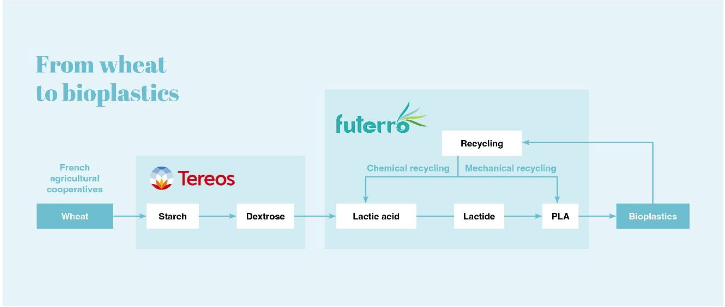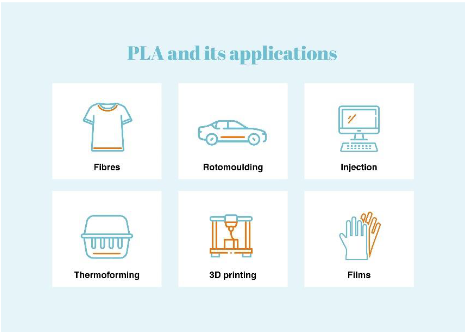
Unprecedented in Europe, two industrial players, experts in their respective fields, are joining forces to develop a circular and sustainable biomanufacturing platform dedicated to green chemistry in Normandy. Futerro, a Belgian pioneer and leader in the production of lactic acid, lactide and PLA (polylactic acid), and Tereos, a cooperative group and a major global player on the sugar, ethanol and starch markets, have signed a strategic agreement. They aim to create a short food-supply chain, in one geographical region, comprising the extraction of dextrose (from sustainably grown French wheat) and its transformation into industrially compostable and recyclable bioplastics. The industrial-port area of Port-Jérôme-Sur-Seine (76) is set to host this unique centre of excellence from 2027.
Tereos and Futerro have today signed a supply agreement that paves the way for the creation of a biomanufacturing platform that will produce innovative and sustainable biomaterials. The collaboration between the two companies is based on ethical sources, with Tereos supplying Futerro every year with 150,000 tonnes of dextrose1 from wheat starch, produced directly at its Lillebonne plant, to supply Futerro’s future biorefinery nearby. Futerro will use this sustainable raw material to produce various bio-based platform molecules2 (lactic acid and lactide) and a recyclable and industrially compostable bioplastic (PLA).
The unique industrial model addresses key economic and environmental challenges:
- Reducing energy requirements, in particular those involving fossil fuels,
- A supply-processing-production loop that remains local and sustainable,
- Maximising the value of all co-products, whether for Tereos or Futerro,
- Sustainable and resilient logistics, with the wheat processed by Tereos mostly grown locally and transported primarily by river. A pipeline system will connect the two neighbouring plants, optimising dextrose logistics. Futerro currently estimates that nearly 50% of its logistics flows will avoid road transport.
- Necessary decarbonisation of the chemical market by finding realistic and efficient alternatives to fossil-
based production.
Local, sustainable and circular socio-economic impact
The overall investment by Futerro through this partnership will bring more than €500 million to the local area. Besides being a large financial investment, the partnership provides a solid basis for maintaining and developing the skilled local workforce. Tereos currently employs more than 175 people in Lillebonne. Futerro estimates that around 1,150 jobs will be created along the new value chain between the two companies, 250 directly and 900 indirectly.
Green chemistry, circularity, decarbonisation, new development paths for agricultural resources and more, this agreement is a leading light for the future of bioindustry.
Tereos’ commitment to the agro-industry of tomorrow
As part of a vast agroecological transformation and transition programme, the Tereos cooperative group is
accelerating sustainability projects to address climate change and meet new social and environmental expectations.
This agreement in Normandy represents a new and tangible step towards its vision of sustainable agriculture and industry. The partnership with Futerro demonstrates the competitiveness of the Tereos starch manufacturing plant located in Normandy. Since 2007, the Lillebonne unit has been transforming wheat:
- into bioethanol,
- into gluten (for baking, aquaculture),
- into pellets (for animal feed),
- and into dextrose (for confectionery, beverages and green chemistry).
€30 million will soon be invested to adapt the production facilities to the needs of this new partnership.
The contract signed with Futerro boosts Tereos’ expertise and highlights the utility of plant solutions (in this case wheat starch) in an industry that needs to decarbonise.
“Tereos is the third-biggest producer of starch products in Europe. Our expertise in maximising the value of plant-based raw materials such as wheat means that we produce quality dextrose. This partnership with Futerro heralds the creation of a new industrial sector around green chemistry and strengthens our position in this market of the future”, explains Olivier Leducq, Managing Director of Tereos.

“We have already shown that we want to drastically decarbonise our own activities, with investments of €800 million in our ambition to reduce emissions from our European industrial plants by 65% in 10 years. Now as a processor of plant-based raw materials, we also want to be a key partner in the decarbonisation of historically petroleum-based industries”, adds Olivier Leducq, Managing Director of Tereos.
Every year, the Tereos plant in Lillebonne processes more than 800,000 tonnes of French wheat. This strategic partnership, which entails a significant annual need for dextrose by Futerro, will thus support the French agricultural sector, by offering wheat producers an additional and growing market that gives their crop added value.
1 Glucose from wheat starch.
2 A “platform molecule” is a molecule derived from renewable raw material that serves as a basis for the synthesis of many other molecules and polymers.
Futerro takes on the Challenges of the French green chemistry sector
Futerro is capitalising on good momentum to further its development. This agreement represents a commitment to the future. In Normandy, Futerro is working to create an industrial synergy aligned with French ambitions in terms of green chemistry.
On 6 December, the Ministry of the economy published its directives and ambitions as part of the new chemical sector contract and declaration of support for the sector. France wants to become the leader in bio-based chemistry from industrial biotechnologies in Europe. This agreement between Tereos and Futerro embodies this will and the appetite of the European players in the sector.
It involves developing numerous biomolecules, serving a wide range of applications and sectors, from a wheat dextrose produced in Normandy. Lactic acid and lactide are platform molecules, which have various uses, in both the synthetic chemistry and agri-food sectors.
A resilient and circular bioplastic
PLA is a bioplastic derived from lactic acid. It has many environmental advantages over its conventional (petroleum- based) counterparts. Its much smaller carbon footprint means this innovative and sustainable polymer can be used to decarbonise the wider plastics industry in the long-term. Industrially compostable and recyclable via chemical and mechanical processes, the various end-of-life options available provide circularity again and again. A realistic alternative, PLA can be used in many types of packaging, including for foodstuffs, as well as to produce textile fibres and non-woven fabrics, to make agricultural and automotive films, or even for biomedical uses.

As an industrial and agricultural country, France has a major role to play in the development of the bioeconomy, biomolecules and bioplastics. Not only are the latter an alternative to fossil materials, but they embody a real social project, supported by both companies and public authorities.
“This strategic alliance highlights the crucial role of green chemistry as a driving force for innovation. Thanks to the support of our partners, we believe our biorefinery project will make a significant contribution to a positive transition for the sector, the Normandy basin and France as a whole. It builds on efforts to address the environmental and economic challenges that have affected the sector for many years”, says Frédéric Van Gansberghe, CEO of Futerro.
About Futerro
Futerro is a leading Belgian company in the production of lactic acid, lactide and PLA (polylactic acid), a bio-sourced and recyclable biopolymer that has potential to replace oil-based plastics in our daily lives.
Completing pioneering research since 1992, the company leaped ahead in 2007 with the construction of its first lacticacid polymerization demonstration plant in Belgium. In 2021, Futerro opened its industrial PLA production unit in China. This plant now has a production capacity of 100,000 tonnes per year. It is the only company in the world to have full end-to-end control of the PLA production chain: fermentation of dextrose
into lactic acid, then polymerization into PLA and finally end-of-life management via its patented molecular recycling technology (LOOPLA®).
About Tereos
The Tereos cooperative group, a union of 11,200 cooperative members, has recognised know-how in the processing of beet, sugarcane, alfalfa, cereals and potatoes. Through 43 industrial sites, a presence in 15 countries and the commitment of its 15,800 employees, Tereos supports its customers close to their markets with a broad and complementary range of products. In 2022/23, the Group posted revenues of €6.6 billion.
Source
Tereos, press release, 2024-04-11.
Supplier
Share
Renewable Carbon News – Daily Newsletter
Subscribe to our daily email newsletter – the world's leading newsletter on renewable materials and chemicals










